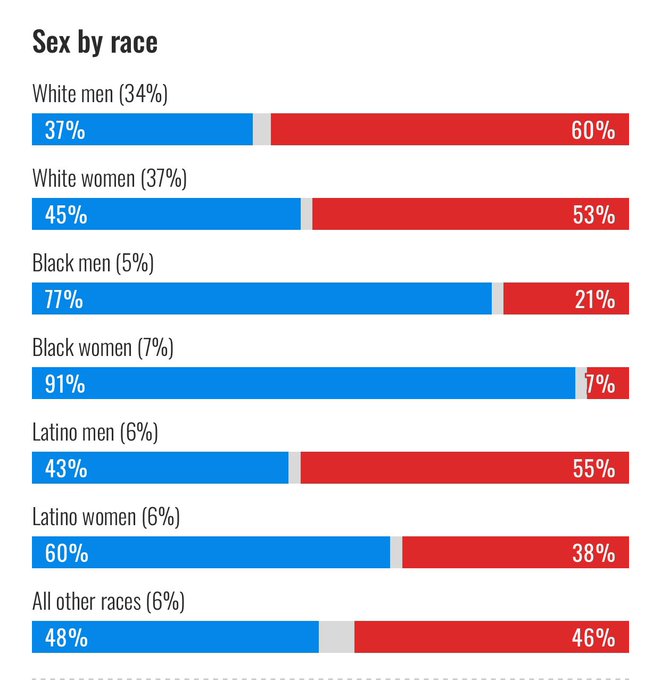It is now time to apply that thinking about emotion and fear and practicality to the bracelets.
First, after the horror of another election became clear, there were many terrible feelings of fear, disappointment, anger and sadness. Completely understandable.
Then, apparently, some white women started to worry that they would be perceived as Trump voters. It's gross, but understandable.
https://x.com/flossymaetacket/status/1854970291115704630/photo/1
Apparently white women voting for Trump only dropped by one percentage point, and we are 37% of the electorate. The split was 53% of white women voting for Trump and 45% for Harris, despite the overturning of Roe largely made possible by Trump's Supreme Court picks... it makes us look like slow learners.
I am not sure of the order in which everything happened. There were definitely TikTok videos suggesting making blue friendship bracelets to show support, but then it looks like there were kits and ready-made bracelets marketed.
(Apparently there is also a call for shaving heads, but emulating skinheads seems like a weird way to stand against white supremacy.)
It made me think of the 2017 Women's March, where the predominant symbol became something representing white womanhood, where the presidential candidate who had taken the hits was ignored, and where they cut off a Black trans woman in the middle of her speech in their rush to get to the Indigo Girls.
It also reminded me of the conversations around #MeToo where men would keep chiming in with "Not all men!" Their focus on themselves and their hurt feelings prevented them from hearing what they needed to hear and work toward solutions.
"Not all white people", "not all white women"... not helpful.
Support can be shown with visible symbols. There are things like Orange Shirt Day and Red Dress Day. They may work to raise awareness, and as personal reminders, but they are hollow without additional action.
This is where spending some time on intent and desire can be helpful.
If we want to show marginalized people that we are safe, a bracelet is not going to do that. If it did actually become a symbol people trusted, you would see people wearing it with bad intent to get opportunities for harm.
If the people around you don't know whom you are safe for, why don't they know?
That is our looking inward. Do we let things go to avoid making waves? Are we unintentionally committing microaggressions? Certainty that you are "one of the good ones" is a great way to not actually be that good.
Are we listening? I found out about the bracelets because I saw Black women criticizing them; are you listening to people that do not look like you?
Besides, should the key goal be making sure people recognize your goodness? Or should we be trying to reduce harm?
That's a harder task, but a better one.
These are terrible times. Easy symbols are not going to fix that.





No comments:
Post a Comment